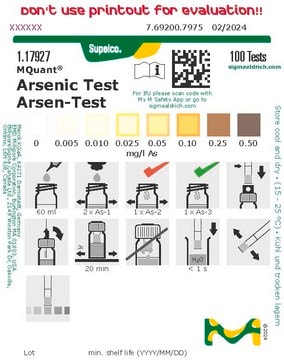48722-U
2-Fluorobiphenyl solution
2000 μg/mL in dichloromethane, analytical standard
About This Item
Productos recomendados
grade
analytical standard
agency
EPA 8090,8100
CofA
current certificate can be downloaded
feature
standard type surrogate
packaging
ampule of 1 mL
concentration
2000 μg/mL in dichloromethane
technique(s)
HPLC: suitable
gas chromatography (GC): suitable
application(s)
environmental
format
single component solution
storage temp.
2-30°C
InChI
1S/C12H9F/c13-12-9-5-4-8-11(12)10-6-2-1-3-7-10/h1-9H
InChI key
KLECYOQFQXJYBC-UHFFFAOYSA-N
¿Está buscando productos similares? Visita Guía de comparación de productos
Categorías relacionadas
General description
Application
signalword
Warning
hcodes
Hazard Classifications
Carc. 2 - Eye Irrit. 2 - Skin Irrit. 2 - STOT SE 3
target_organs
Central nervous system
Storage Class
6.1D - Non-combustible acute toxic Cat.3 / toxic hazardous materials or hazardous materials causing chronic effects
wgk_germany
WGK 2
flash_point_f
Not applicable
flash_point_c
Not applicable
ppe
Eyeshields, Faceshields, Gloves, type ABEK (EN14387) respirator filter
Elija entre una de las versiones más recientes:
¿Ya tiene este producto?
Encuentre la documentación para los productos que ha comprado recientemente en la Biblioteca de documentos.
Nuestro equipo de científicos tiene experiencia en todas las áreas de investigación: Ciencias de la vida, Ciencia de los materiales, Síntesis química, Cromatografía, Analítica y muchas otras.
Póngase en contacto con el Servicio técnico










